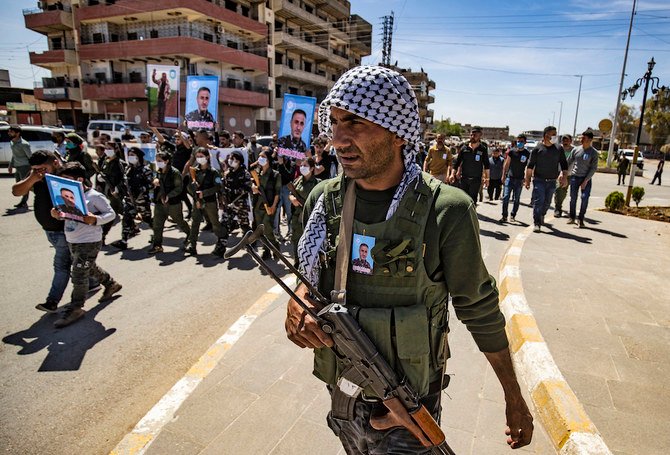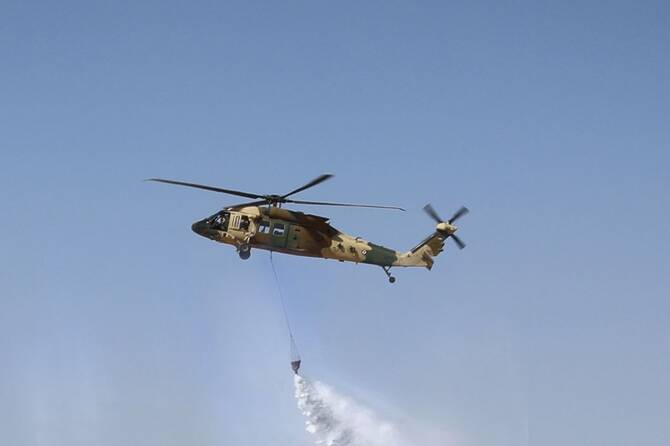MISSOURI, USA: Ilham Ahmed, head of the political wing of the Syrian Democratic Forces (SDF), has been lobbying Moscow and Washington to support Kurdish representation in the long-stalled, UN-backed Syrian peace process.
Ahmed, who has visited both capitals in recent weeks, also wants the country’s Kurdish-run region to be exempted from sanctions imposed under the 2019 Caesar Syria Civilian Protection Act, the US legislation that sanctioned the regime of President Bashar Assad for war crimes against the Syrian people.
But what are the Syrian Kurds hoping for, precisely, and how viable are their proposals?
Russian jets, Iran-backed fighters, Turkish-supported insurgents, Islamist radicals, US troops and Syrian government forces, as well as the Kurdish People’s Protection Units (YPG), operate across the patchwork of territories that constitute northern Syria.
The US views the YPG as a key ally in the fight against Daesh in northeastern Syria while Russia has forces in the area to support President Assad.
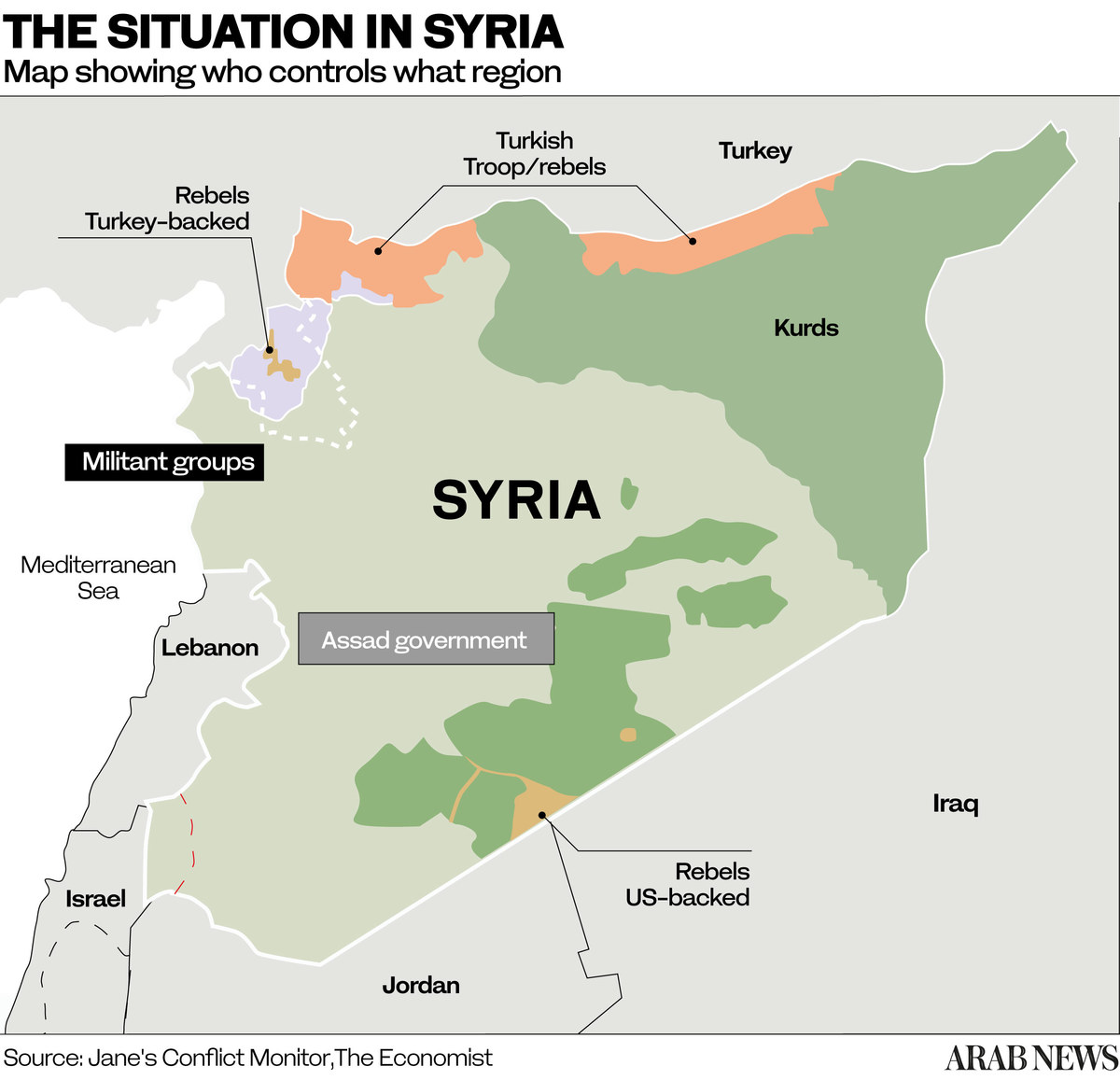
While some media outlets reported that Ahmed, as the president of the executive committee of the Syrian Democratic Council (SDC), was lobbying for American or Russian support for the creation of a breakaway state, the Syrian Kurds are not actually pushing for such a maximalist goal.
The Syrian Kurdish parties are sympathetic to the ideology of jailed Kurdistan Workers’ Party (PKK) leader Abdullah Ocalan. They say they reject nationalism, secession and statism in general, in line with Ocalan’s post-2001 writings.
At the same time, however, Syrian Kurdish organizations appear to be establishing all the trappings of their own separate state in the territory they control.
Their military forces — including the SDF, the YPG and the YPJ, the YPG’s all-female militia — are working assiduously to establish and maintain their monopoly on the use of force in the northeast.
They have clashed not only with Turkish forces and various Islamist extremist groups in the area, but also on occasion with Kurdish armed groups, the military forces of the Assad regime, Free Syrian Army rebels and others.
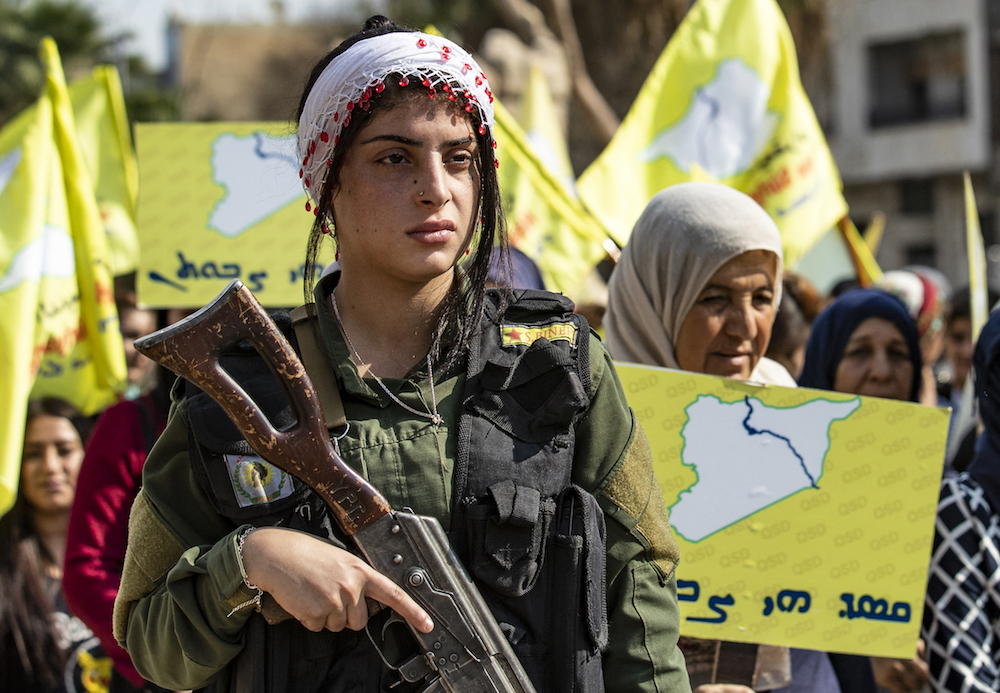
A member of the Kurdish internal security services known as Asayish stands guard during a demonstration by Syrian Kurds against the Turkish assault on northeastern Syria and in support of the Syrian Democratic Forces (SDF), in Syria’s northeastern city of Qamishli. (AFP/File Photo)
Competing political parties in the territories under their control have likewise faced pressure, or outright bans, as the SDC and its ally, the Democratic Union Party (PYD), seek to bring everyone under the same institutional and governing structures that they created and dominate.
In some ways the Kurds of the SDC and PYD have proven to be very liberal, happily welcoming Arab tribes, Christians, Yezidis, Armenians, Turkmen and other groups and ethnicities into their ranks and governing structures.
However, they appear much less accepting and tolerant of those who seek to operate outside of the “democratic autonomy” political umbrella they have established.
With their own security forces, political institutions, schools and a variety of party-established civil-society organizations, it does at times look as though the Syrian Kurds are intent on creating their own separate state. But what choice did they have after the outbreak of civil war in Syria in 2011?
The Assad regime had brutally repressed Kurds for decades prior to the war. After Assad withdrew his forces and much of the Syrian government’s personnel from northeast Syria early in the conflict, to focus on the western and southern parts of the country where the rebel threat appeared the greatest, someone had to fill the resultant vacuum.
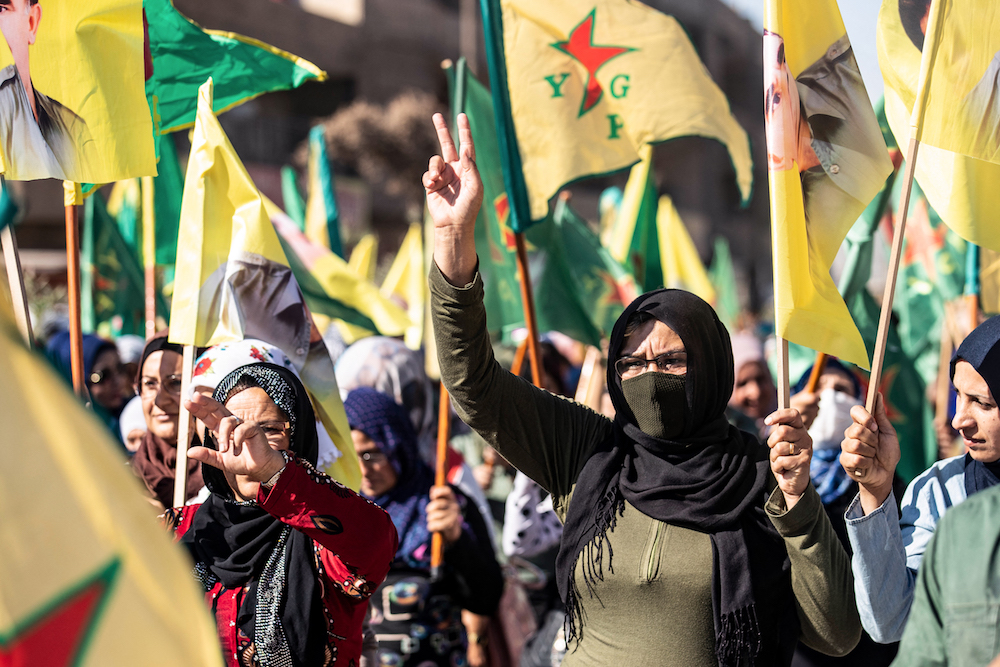
Syrian Kurdish women carry party flags, as they take part in a rally in support of the Syrian Democratic Forces (SDF) and the People’s Protection Forces. (AFP/File Photo)
PKK-aligned Syrian Kurdish groups moved in to defend the area against Daesh and other extremist groups that were trying to take over. They fought extremely hard against the radical Islamists, handing Daesh its first defeat, in Kobani in 2014.
Freed from the regime’s iron grip for the first time in their lives, the Kurds seized the opportunity to establish Kurdish and other minority-language programs, cultural centers, schools and institutions.
Fearing the malign “divide and conquer” tactics of neighboring powers, the new Syrian Kurdish authorities rejected attempts by other Kurdish parties, particularly those under the influence of Iraqi Kurdistan’s regional government, and Arab rebel groups to establish competing parties and militias in their hard-won territory.
Authorities in Turkey, meanwhile, were concerned by what they saw as an emerging PKK-controlled proto-state on their southern border. Through three military incursions in the last five years that displaced hundreds of thousands of ethnic Kurds, Ankara seized hundreds of kilometers of the border strip and pushed around 30 km into northern Syria.
In 2018, Moscow appeared to greenlight the Turkish invasion of Afrin, which at the time was under SDF/YPG/PYD control, withdrawing its troops and allowing Turkish jets to operate in air space previously controlled by Russia.
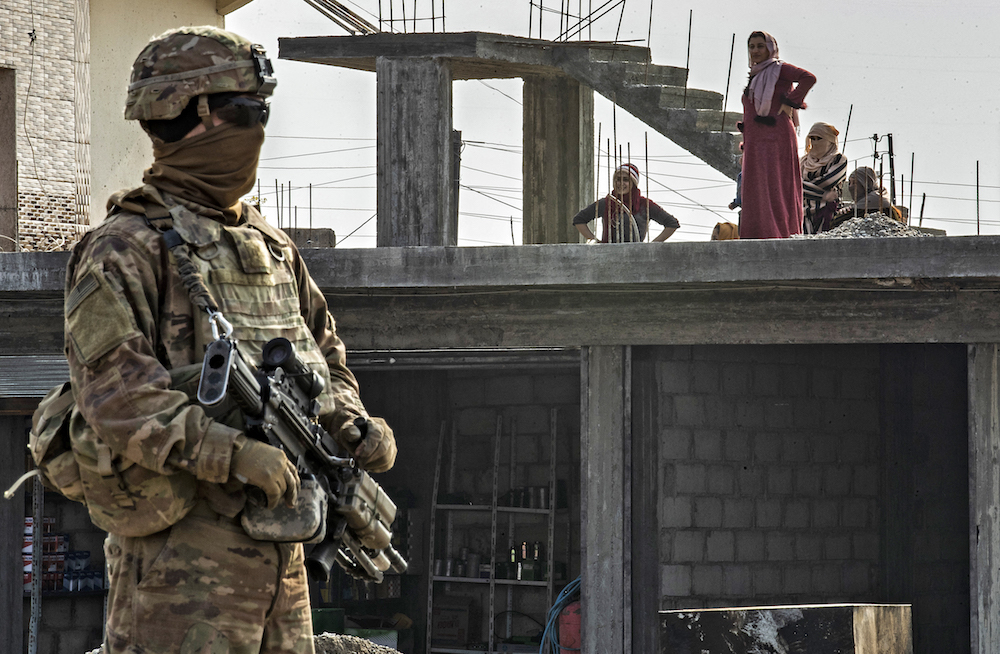
Woman watch from a rooftop as US troops patrol in 2020 along the streets of the Syrian town of Al-Jawadiyah and meet the inhabitants, in the northeastern Hasakeh province, near the border with Turkey. (AFP/File Photo)
The following year, Washington appeared to do the same, withdrawing US troops from the Tal Abyad area on the border with Turkey just before the Turkish invasion.
These incursions have left the Syrian Kurdish administration in a serious bind. Without American support and the presence of a token US tripwire force, Turkey could well expand its area of control in northern Syria.
Just this week, President Recep Tayyip Erdogan said Turkey was determined to eliminate alleged threats originating in northern Syria and that a suspected YPG attack that killed two Turkish police officers in Azaz was “the final straw.”
Meanwhile, the Assad regime appears uninterested in any proposals for a “more decentralized Syrian state” in which parts of the northeast would remain nominally a part of the state but actually fall under Syrian Kurdish control.
Ahmed’s recent diplomatic forays have therefore focused on Moscow and Washington. In the former, the Syrian Kurds hope to convince the Russians to cajole the Assad regime into some sort of a compromise that would safeguard as much autonomy in northeastern Syria as possible. In the latter they aim to secure a US commitment not to abandon them again.
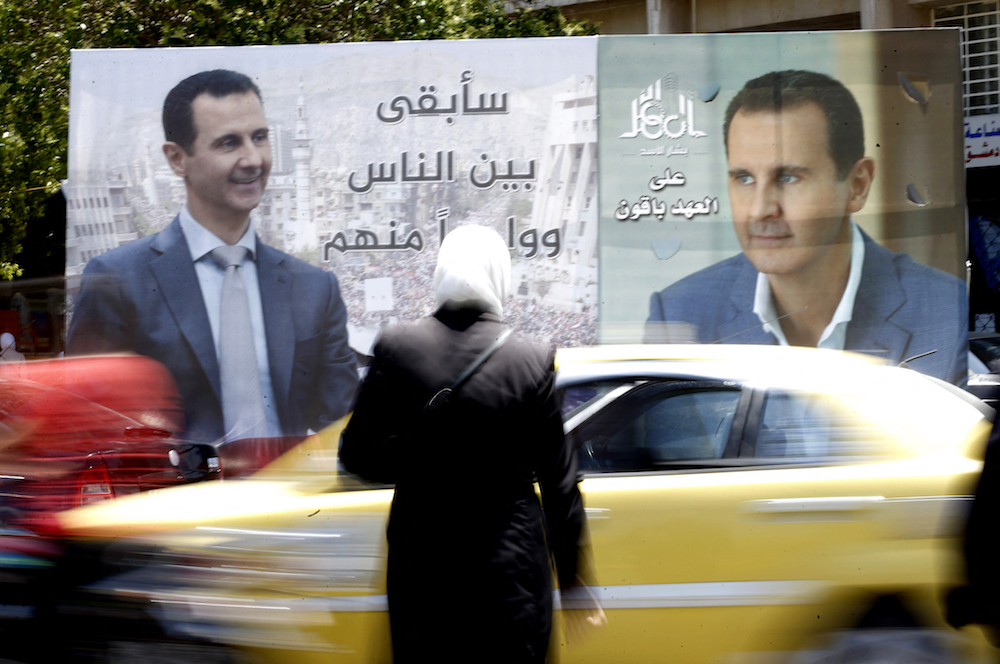
Cars drive past election campaign billboards depicting Syrian President Bashar Al-Assad, a candidate for the upcoming presidential vote, in the capital Damascus, on May 24, 2021. (AFP/File Photo)
Ahmed outlined her hopes during a conference hosted by the Washington Institute on Sept. 29.
“The Syrian Democratic Council seeks a lasting political solution to the conflict, advocating internal dialogue and, ultimately, political and cultural decentralization that respects the country’s diversity and bolsters economic development,” she said.
“Continued support from our partner, the US, is crucial to this mission. The Autonomous Administration of North and East Syria faces numerous obstacles, including insecurity, poverty, foreign intervention, and terrorism.
“In addition, the Geneva peace process and constitutional process have stalled. The US could help alleviate these issues in the pursuit of a more stable Syria free of despotism, proxy conflicts and terror.”
America’s chaotic exit from Afghanistan in August undoubtedly will have unnerved Syrian Kurds already apprehensive about their own future. Assad, Turkey and Daesh would all welcome a similar US withdrawal from northeastern Syria.
It is unlikely the “Autonomous Administration of North and East Syria,” the governing body of which is the SDC, would be able to hold up against such combined pressures.
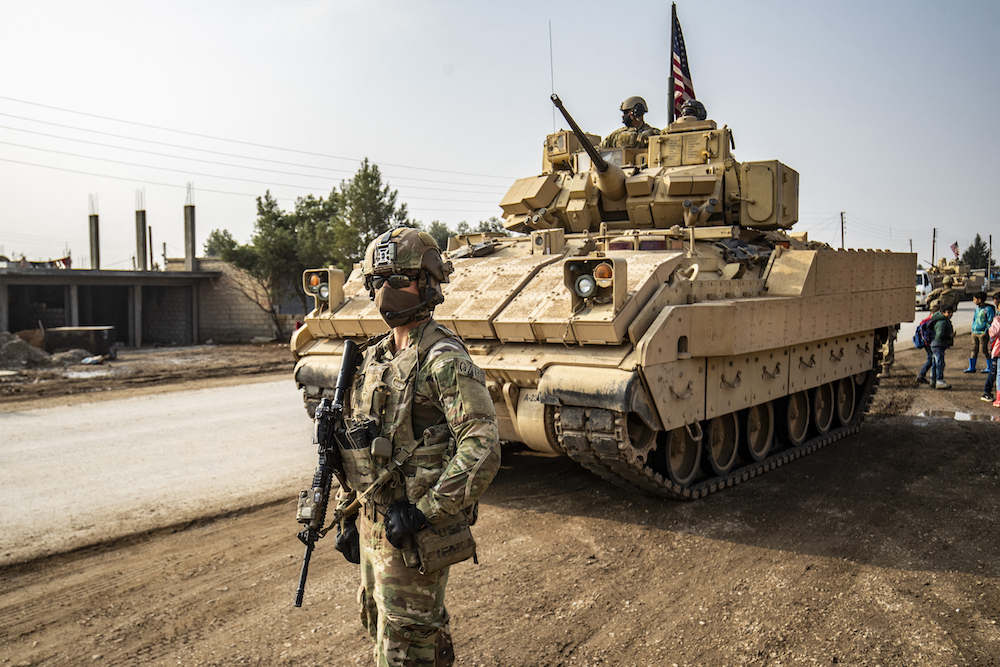
US troops patrol along the streets of the Syrian town of Al-Jawadiyah. (AFP/File Photo)
However, the botched American withdrawal from Afghanistan might actually work in Syrian Kurds’ favor, as the Biden administration will probably try to avoid a similar embarrassment in Syria any time soon.
Following meetings in Washington last month with representatives of the White House, State Department and Pentagon, Ahmed seems to have received a reassuring response.
“They (the Americans) promised to do whatever it takes to destroy Islamic State (Daesh) and work to build infrastructure in northeastern Syria,” she told the Reuters news agency. “They said they are going to stay in Syria and will not withdraw — they will keep fighting Islamic State.”
She added: “Before, they were unclear under Trump and during the Afghan withdrawal, but this time they made everything clear.”
With no change of attitudes in Damascus or Ankara, the Syrian Kurds are left with little choice but to continue to rely on the American presence, cooperation and support. At best, they can extend the status quo and the longevity of their precarious autonomy.
If they can convince Washington and Russia to help them reopen the crossings on the border with Iraq, exempt them from the sanctions designed to target the Assad regime, and allow the delivery of international aid directly to their enclave, rather than being routed through Damascus with the result that it rarely reaches the northeast, then the political and economic situation will improve.
Without a more durable political solution on the horizon, this is probably the best the Syrian Kurds can hope for.
————–
* David Romano is Thomas G. Strong professor of Middle East politics at Missouri State University



